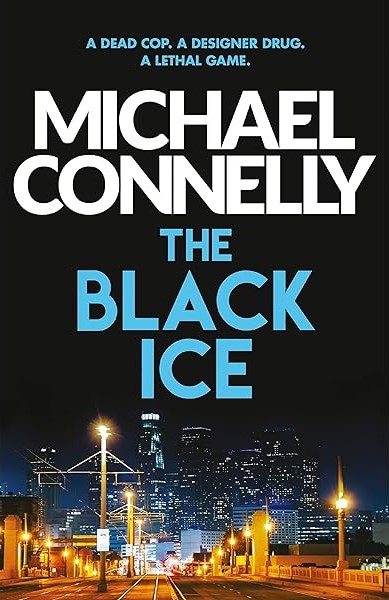We’re only two Bosch novels in and already the man finds himself fighting a bull. It’s difficult not to think “we’re at this point already?” For a policeman who is supposed to be grounded in his approach to the law, Bosch finds himself caught up in multiple flights of fancy in The Black Ice. It’s hard to say whether he does more or less bad police work than in his previous outing, but he’s still a fun guy to hang around.
When narcotics officer Calexico Moore turns up dead in a motel room on Christmas Day, the entire police fraternity was expecting it. But Detective Harry Bosch, still in exile, gets a bad feeling about the scene, and thinks the man has been murdered. Punished with having to solve a coworker’s shoddy caseload, Bosch sees too many links to Moore’s death to be mere coincidence and, while pretending to stay within the lines, he ends up chasing these disparate threads all the way across the border.
In The Black Ice, Michael Connelly makes up a new drug so that he can use its name as a metaphor. Hawaii is briefly mentioned but never comes up again once Bosch decides that Mexico is where his heart lies. If you’ve read The Black Echo, you already know that Bosch doesn’t believe in coincidences, and he’s right not to — although the connections aren’t near so outlandishly tied together as they were there.
Yet Bosch’s professionalism remains questionable. He is tasked with informing Moore’s ex-wife with news of his death. You can probably guess what happens the next time they meet. A lot of the first half of the book sees him bumbling along in the largely empty LA at the dying end of a year. Fortunately his skills of detection are good enough that The Black Ice is not a mystery that would have solved itself without him, but the real mystery is why do two separate people tell him he can see himself out when they no longer want them at their workplaces? You know he’s not going to do that.
The Black Ice opens up a bit more when Bosch starts snooping in the border cities of Calexico and Mexicali, which a brief fact check will assure you are real places. He’s much more of a lone wolf in this instalment even if he doubles the number of women he sleeps with, and he has few sounding boards and a distinct dearth of trust. Connelly provides legitimately interesting history lessons and exposes the demography of the towns, and you can feel that Bosch is engaging with the case even if realistically he would have been murdered repeatedly before the story was over.
Connelly produces a few too many echoes too soon in the series: both books open with a corpse that is attributed to misadventure that ultimately proves to be murder, and they have near identical titles. The Black Ice has its points of difference, but not all to the good: Bosch is not built for espionage, yet he takes on some truly foolhardy reconnaissance work; by the time the bullfight is reached it’s almost enough to wonder what precisely you’re reading. While the police bureaucracy is frequently exposed as corrupt, often due to media management rather than simple greed and personal gain, it’s difficult not to consider all of the rules that Bosch breaks as in place for a reason.
For all of these weird excesses in what is only the second in a series, Connelly can still sell you a line. Bosch’s solitary Christmas that opens the novel is rendered in a dark and pathetic light, rather than mere solitude. Then Connelly hits you with the big guns later on:
Being alone on New Year’s Eve bothered him more than Christmas, Thanksgiving, any of the other days. New Year’s Eve was a night for jazz, and the saxophone could cut you in half if you were alone.”
It might sound histrionic, but that’s exactly the point. When Connelly is giving you what you want, he really gives it to you, like when Bosch warns a fellow officer he’s exchanging information with: “It’s all a cesspool, man. Doesn’t matter if you’re on the bottom or the top. You’re still swimming in shit.” And the man knows how to craft a final paragraph.
You stick with The Black Ice for these moments, what you can consider the essence of the character who has to carry a series on his back. The Black Ice may be a bit silly, but therein lies the appeal. Bosch is too gung-ho, and it’s absolutely ridiculous to expect one man to do all this in the week between major holidays, but Michael Connelly is refining him into more of a man you want to spend time with: Bosch may be bitter and alone, but he’s riding with us now.


